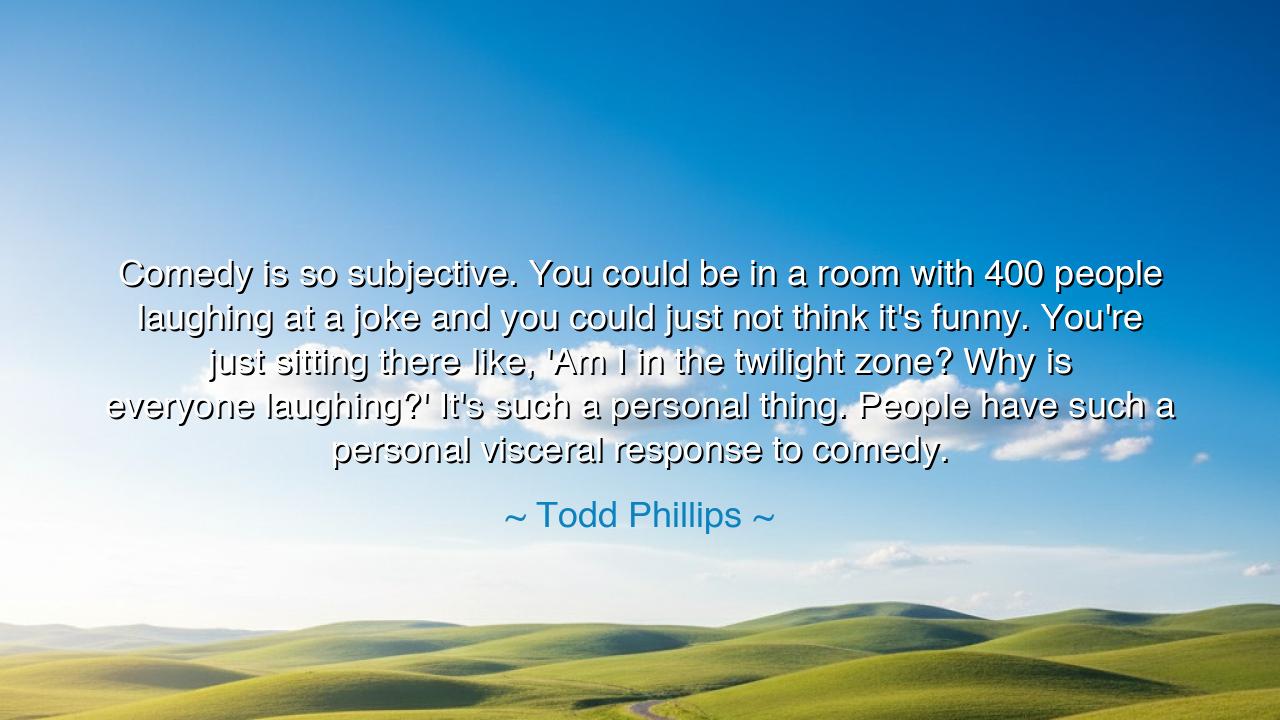
Comedy is so subjective. You could be in a room with 400 people
Comedy is so subjective. You could be in a room with 400 people laughing at a joke and you could just not think it's funny. You're just sitting there like, 'Am I in the twilight zone? Why is everyone laughing?' It's such a personal thing. People have such a personal visceral response to comedy.






In the words of Todd Phillips, “Comedy is so subjective. You could be in a room with 400 people laughing at a joke and you could just not think it’s funny. You’re just sitting there like, ‘Am I in the twilight zone? Why is everyone laughing?’ It’s such a personal thing. People have such a personal visceral response to comedy.” — here lies a truth as ancient as storytelling itself: that laughter, like love and faith, springs not from logic but from the secret chambers of the heart. Phillips speaks as one who has studied the craft of laughter not as a mere entertainer, but as a philosopher of the absurd — one who understands that humor is not universal, but deeply human, shaped by memory, culture, pain, and spirit.
To say that comedy is subjective is to recognize that every soul has its own rhythm, its own melody of mirth. What causes one person to roar with laughter may leave another untouched. This is because laughter is not born from the joke alone, but from the listener’s life — from what they have lived, endured, and understood. In a room of four hundred people, there are four hundred worlds. And when one joke echoes through them, it meets those worlds differently — in some it strikes the chord of recognition, in others, silence. To laugh is to resonate, and not every heart vibrates to the same tune.
The ancients knew this well. In the days of the Greek Dionysian festivals, where poets and playwrights offered their comedies to the people, the laughter of the crowd would rise and fall like the tides of the sea. Some laughed at the folly of kings, others at the blunders of fools, but always there were those who sat in stillness — their hearts unmoved. The wise playwright Aristophanes once said that the laughter of men is a mirror of their souls: “If you would know what a people love and fear, listen to what they laugh at.” Phillips’s reflection echoes this same truth — that comedy reveals not sameness, but difference, and that this difference is what makes humanity so wondrously alive.
There is a story from the modern age that illuminates this truth. When Charlie Chaplin, the great silent comedian, entered a “Charlie Chaplin look-alike contest” under disguise, he placed third. The irony of the world’s greatest comic losing a contest in imitation of himself is not merely amusing — it is instructive. It shows us that even the essence of humor cannot be replicated perfectly, that laughter is not born from formula, but from the mysterious meeting between soul and circumstance. The world may recognize the same image, but not the same feeling.
The origin of this understanding lies in the very nature of art and perception. All true experience — whether of laughter, love, or awe — is filtered through the self. A joke, like a melody, is nothing until it finds an ear ready to receive it. Phillips speaks not only of comedy, but of the eternal paradox of communication: we are beings seeking connection through emotion, yet what moves one heart may leave another untouched. Thus, comedy, that lightest of arts, becomes one of the deepest, because it exposes the invisible boundaries between us.
From this, the lesson becomes clear: seek not to make all laugh, but to laugh with truth. The wise comedian, like the wise philosopher, does not chase universal approval, for he knows that truth is never unanimous. Instead, he speaks with sincerity, trusting that his humor will find those who understand. In this way, comedy becomes communion — a meeting of spirits across the gulf of difference. And for those who listen, even disagreement can be sacred, for it reminds us that life’s beauty lies in diversity.
Therefore, my child, when you find yourself in a room where others laugh and you do not, do not feel estranged. You are not lost in the twilight zone; you are simply standing in the temple of individuality. Honor your own response, and respect the laughter of others, for both are expressions of the living heart. Likewise, when your own humor falls upon silence, do not despair — for silence too is a response, a reminder that your voice, like all art, will find its proper audience in time.
So let us remember this: laughter is a personal revelation, not a universal decree. It is the voice of the soul recognizing itself in the dance of life. As Todd Phillips teaches, comedy is not about being right or wrong, but about being real — about touching the invisible threads that connect one human spirit to another. In this way, to make another laugh, or even to understand why they laugh, is to participate in one of the oldest miracles known to humankind: the miracle of shared feeling amidst infinite difference.






AAdministratorAdministrator
Welcome, honored guests. Please leave a comment, we will respond soon